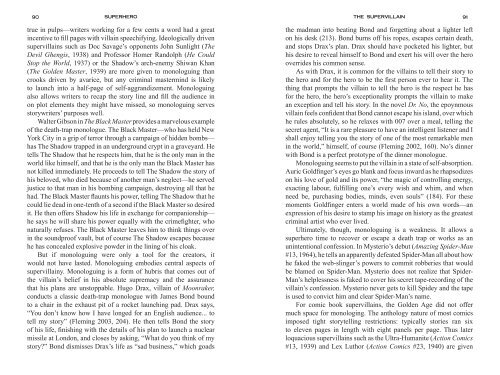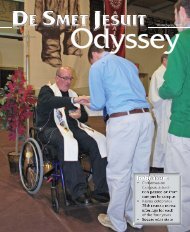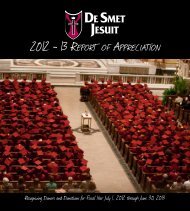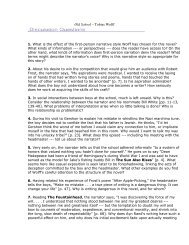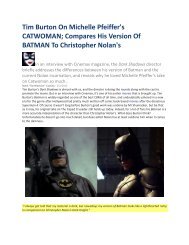Superhero: The Secret Origin of a Genre by Peter Coogan - Resources
Superhero: The Secret Origin of a Genre by Peter Coogan - Resources
Superhero: The Secret Origin of a Genre by Peter Coogan - Resources
Create successful ePaper yourself
Turn your PDF publications into a flip-book with our unique Google optimized e-Paper software.
90 SUPERHERO THE SUPERVILLAIN91true in pulps—writers working for a few cents a word had a greatincentive to fill pages with villain speechifying. Ideologically drivensupervillains such as Doc Savage’s opponents John Sunlight (<strong>The</strong>Devil Ghengis, 1938) and Pr<strong>of</strong>essor Homer Randolph (He CouldStop the World, 1937) or the Shadow’s arch-enemy Shiwan Khan(<strong>The</strong> Golden Master, 1939) are more given to monologuing thancrooks driven <strong>by</strong> avarice, but any criminal mastermind is likelyto launch into a half-page <strong>of</strong> self-aggrandizement. Monologuingalso allows writers to recap the story line and fill the audience inon plot elements they might have missed, so monologuing servesstorywriters’ purposes well.Walter Gibson in <strong>The</strong> Black Master provides a marvelous example<strong>of</strong> the death-trap monologue. <strong>The</strong> Black Master—who has held NewYork City in a grip <strong>of</strong> terror through a campaign <strong>of</strong> hidden bombs—has <strong>The</strong> Shadow trapped in an underground crypt in a graveyard. Hetells <strong>The</strong> Shadow that he respects him, that he is the only man in theworld like himself, and that he is the only man the Black Master hasnot killed immediately. He proceeds to tell <strong>The</strong> Shadow the story <strong>of</strong>his beloved, who died because <strong>of</strong> another man’s neglect—he servedjustice to that man in his bombing campaign, destroying all that hehad. <strong>The</strong> Black Master flaunts his power, telling <strong>The</strong> Shadow that hecould lie dead in one-tenth <strong>of</strong> a second if the Black Master so desiredit. He then <strong>of</strong>fers Shadow his life in exchange for companionship—he says he will share his power equally with the crimefighter, whonaturally refuses. <strong>The</strong> Black Master leaves him to think things overin the soundpro<strong>of</strong> vault, but <strong>of</strong> course <strong>The</strong> Shadow escapes becausehe has concealed explosive powder in the lining <strong>of</strong> his cloak.But if monologuing were only a tool for the creators, itwould not have lasted. Monologuing embodies central aspects <strong>of</strong>supervillainy. Monologuing is a form <strong>of</strong> hubris that comes out <strong>of</strong>the villain’s belief in his absolute supremacy and the assurancethat his plans are unstoppable. Hugo Drax, villain <strong>of</strong> Moonraker,conducts a classic death-trap monologue with James Bond boundto a chair in the exhaust pit <strong>of</strong> a rocket launching pad. Drax says,“You don’t know how I have longed for an English audience... totell my story” (Fleming 2003, 204). He then tells Bond the story<strong>of</strong> his life, finishing with the details <strong>of</strong> his plan to launch a nuclearmissile at London, and closes <strong>by</strong> asking, “What do you think <strong>of</strong> mystory?” Bond dismisses Drax’s life as “sad business,” which goadsthe madman into beating Bond and forgetting about a lighter lefton his desk (213). Bond burns <strong>of</strong>f his ropes, escapes certain death,and stops Drax’s plan. Drax should have pocketed his lighter, buthis desire to reveal himself to Bond and exert his will over the herooverrides his common sense.As with Drax, it is common for the villains to tell their story tothe hero and for the hero to be the first person ever to hear it. <strong>The</strong>thing that prompts the villain to tell the hero is the respect he hasfor the hero, the hero’s exceptionality prompts the villain to makean exception and tell his story. In the novel Dr. No, the epoynmousvillain feels confident that Bond cannot escape his island, over whichhe rules absolutely, so he relaxes with 007 over a meal, telling thesecret agent, “It is a rare pleasure to have an intelligent listener and Ishall enjoy telling you the story <strong>of</strong> one <strong>of</strong> the most remarkable menin the world,” himself, <strong>of</strong> course (Fleming 2002, 160). No’s dinnerwith Bond is a perfect prototype <strong>of</strong> the dinner monologue.Monologuing seems to put the villain in a state <strong>of</strong> self-absorption.Auric Goldfinger’s eyes go blank and focus inward as he rhapsodizeson his love <strong>of</strong> gold and its power, “the magic <strong>of</strong> controlling energy,exacting labour, fulfilling one’s every wish and whim, and whenneed be, purchasing bodies, minds, even souls” (184). For thesemoments Goldfinger enters a world made <strong>of</strong> his own words—anexpression <strong>of</strong> his desire to stamp his image on history as the greatestcriminal artist who ever lived.Ultimately, though, monologuing is a weakness. It allows asuperhero time to recover or escape a death trap or works as anunintentional confession. In Mysterio’s debut (Amazing Spider-Man#13, 1964), he tells an apparently defeated Spider-Man all about howhe faked the web-slinger’s powers to commit robberies that wouldbe blamed on Spider-Man. Mysterio does not realize that Spider-Man’s helplessness is faked to cover his secret tape-recording <strong>of</strong> thevillain’s confession. Mysterio never gets to kill Spidey and the tapeis used to convict him and clear Spider-Man’s name.For comic book supervillains, the Golden Age did not <strong>of</strong>fermuch space for monologing. <strong>The</strong> anthology nature <strong>of</strong> most comicsimposed tight storytelling restrictions: typically stories ran sixto eleven pages in length with eight panels per page. Thus laterloquacious supervillains such as the Ultra-Humanite (Action Comics#13, 1939) and Lex Luthor (Action Comics #23, 1940) are given


